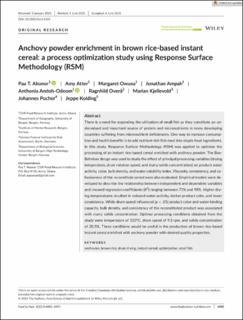| dc.description.abstract | There is a need for expanding the utilization of small fish as they constitute an undervalued and important source of protein and micronutrients in many developing countries suffering from micronutrient deficiencies. One way to increase consumption and health benefits is to add nutrient-rich fish meal into staple food ingredients. In this study, Response Surface Methodology (RSM) was applied to optimize the processing of an instant rice-based cereal enriched with anchovy powder. The Box-Behnken design was used to study the effect of principal processing variables (drying temperature, drum rotation speed, and slurry solids concentration) on product water activity, color, bulk density, and water solubility index. Viscosity, consistency, and cohesiveness of the reconstitute cereal were also evaluated. Empirical models were developed to describe the relationship between independent and dependent variables and showed regression coefficients (R2) ranging between 71% and 98%. Higher drying temperatures resulted in reduced water activity, darker product color, and lower consistency. While drum speed influenced (p < .05) product color and water-binding capacity, bulk density, and consistency of the reconstituted product was associated with slurry solids concentration. Optimal processing conditions obtained from the study were temperature of 130°C, drum speed of 9.3 rpm, and solids concentration of 20.5%. These conditions would be useful in the production of brown rice-based instant cereal enriched with anchovy powder with desired quality properties. | en_US |
